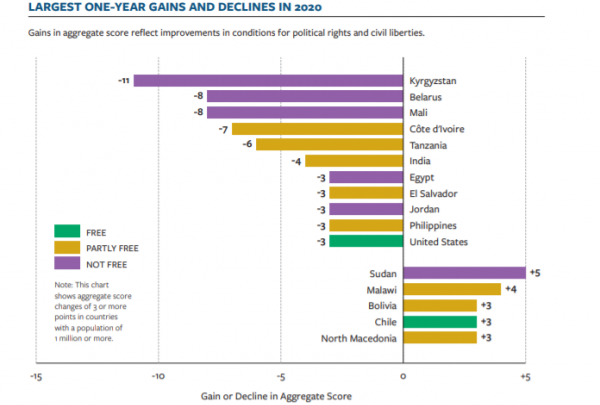Freedom House’s latest report, entitled “Freedom in the World 2021” gives North Macedonia a rating of 66/100 points, three points more than last year, which ranks it among the top five countries with largest one-year index score gain, the only European country on the list.
66 points put North Macedonia in the group of “partly free” countries, alongside all other Western Balkan countries, as well as Hungary, Ukraine, Moldavia, Georgia, Armenia, India and Mexico.
Moreover, the country has 27/40 points regarding political rights and 39/60 regarding civil liberties.
The report notes that the recently reelected government of Prime Minister Zoran Zaev has reversed years of democratic backsliding, stressing EU praise regarding judicial reforms and the need to continue implementing reforms aimed at enhancing judicial independence.
“North Macedonia’s reformist government was reelected, and its institutions have largely recovered from damage inflicted by the fugitive former prime minister, Nikola Gruevski,” underlines the report.
Freedom House also notes progress in civil society engagement, stressing that since the change in government in 2017, the work of nongovernmental organizations (NGOs) has become freer and safer.
The report adds that North Macedonia’s media landscape is deeply polarized along political lines, and private media outlets are often tied to political or business interests that influence their content. However, a wide collection of critical and independent outlets operate and are found mainly online. Journalists remain subject to political pressure and harassment, and physical attacks continue to be reported, reads the report.
“The recently reelected government of Prime Minister Zoran Zaev has reversed years of democratic backsliding, but the country continues to be denied a chance to join the European Union,” it notes.
The report cites July’s parliamentary elections as one of the crucial events in North Macedonia in 2020, adding it produced a virtual tie between the governing Social Democratic Union of Macedonia (SDSM) and the Internal Macedonian Revolutionary Organization–Democratic Party for Macedonian Unity (VMRO–DPMNE).
“The polls were competitive, credible, and took place without major incident, and the SDSM formed a governing coalition with smaller parties shortly thereafter,” underlines the report.
Other crucial events, it stresses, include the approval of a new public prosecutor law which “was part of an ongoing reform drive aimed at open accession talks with the European Union (EU),” as well as EU’s readiness to start accession negotiations before the end of the year.
“In October, the EU signaled that it was prepared to start accession negotiations before the end of the year. In November, though, the Bulgarian government blocked the start of talks,” reads the report.
Regarding coronacrisis management, the report notes that authorities enacted various measures restricting movement and other activities in response to the COVID-19 pandemic, and a state of emergency was in place at year’s end.
“Violators could be fined, but were not subject to violence or other forms of disproportionate enforcement. According to the country’s public health office, 75,500 COVID-19 cases had been confirmed by mid-December,” adds the report.















